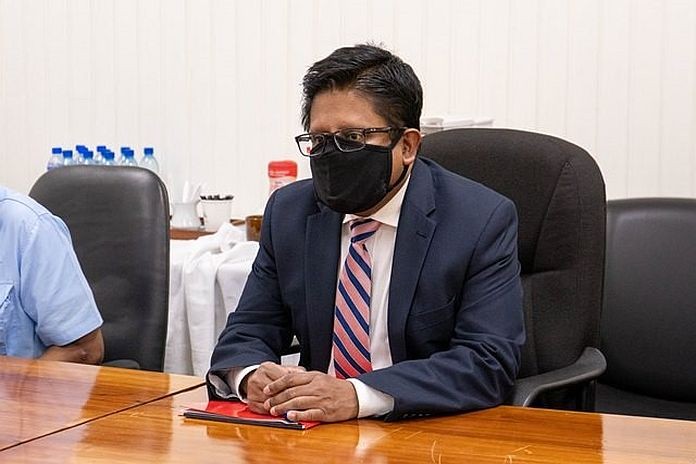By Natasha Smith-Thomas
GEORGETOWN, Guyana, (DPI) – The World Bank in its Global Economic Prospects released on Tuesday, projected that Guyana’s economy would grow by some 49.7 percent in 2022.
According to the report “in the Caribbean, growth is projected to be 7.3 percent this year and 5.9 percent in 2023, though the aggregate reflects a large contribution from Guyana, where offshore oil production recently began. Growth in the Caribbean excluding Guyana, most of which is highly reliant on tourism, is projected to be substantially weaker, at 4.6 percent in 2022 and 4.2 percent in 2023.
Responding to this latest projection, finance minister Dr Ashni Singh noted that this is a result of the work that government has put into creating an investor-friendly environment.
“We are pleased to see the positive revision in the World Bank’s outlook for Guyana. This is good news, but we are not surprised. This is, in fact, to be expected given our government’s strong policy stance as it relates to economic growth, to investment, to job creation and income generation for the benefit of all Guyanese,” Dr Singh said.
He told DPI that the projection also reflects the “continuous optimism in the Guyanese economy, not just by those of us who are here in Guyana, but in fact by all those who are following economic developments in Guyana, including the international investment community and international agencies involved in the task of monitoring economic developments.”
Finance minister Dr Singh recalled that when the administration took office in August 2020, a lot of work had to be done to bring back investor confidence. This was done, firstly, by keeping the population safe while containing the adverse consequences of the Covid-19 pandemic on economic activity, which was combined with the political situation at the time.
He said several interventions aimed at stimulating economic activity, including injecting liquidity in the economy through the Covid-19 cash grant, reduction of taxes, and increased public expenditure in critical infrastructure projects were undertaken.
“What we are seeing now is the result of measures and interventions such as this. It’s significant also that this outlook is being issued at a time when we are still grappling with the tail end of the effects of the severe and devastating floods that we had in 2021,” he noted.
Like interventions during the COVID pandemic, the government was swift to provide support to those affected by the severe countrywide flood last year, which is also expected to affect agricultural production in 2022.
“Economic growth is all about confidence and during the 2015-2020 period, the then APNU+AFC government had adopted an extremely hostile posture towards the private sector and towards private investment and so during that five-year period we saw economic confidence, investor confidence at an all-time low,” Dr Singh said.
“From the time the APNU +AFC refused to respect the results of the ‘no confidence’ motion in December 2018, and then refuse to respect the results of the election in March 2020, what you had was a complete dissipation of investor confidence in Guyana, to a historic low,” he added.
However, the government took steps to correct this image of Guyana.
“Guyana under the current dispensation is an environment that is welcoming to private investment, in particular international investors, as well as domestic private investors, that this government led by president Irfaan Ali welcomes investment and encourages investment and will facilitate inward investment by international investors, as well as investment by domestic private investors. So, we sent those signals and we had to adopt a policy stance, in all that we did, that is conducive and supportive of private investment.”
He also noted the interventions in the emergency budget of 2020 and the 2021 national budget which reduced land rental fees, taxes on construction materials, and removed corporate taxes on the health and education sectors, among others.
Government also promoted the non-oil economy, with the recent enactment of a local content legislation, which is aimed at promoting a non-oil economy, benefitting from what’s happening in the oil and gas sector.
“The private sector is responding. They are seeing as we came into government, we moved swiftly to articulate a local content policy, and then we move swiftly to enact local content legislation, that itself is an intention that unavoidably will stimulate confidence and investor optimism,” he said.
Bureaucracy was also a major issue that needed to be addressed as “many companies couldn’t move because they had applications for permits and licences and so were stuck in a bureaucratic quagmire and so we moved immediately to unlock those,” Dr Singh said.
“The growth that you are seeing thus far since we assumed office, the return to growth in the economy and the anticipated very strong outlook going forward are really reflective of president Ali’ s government, our government’s strong commitment to ensuring that our economy achieve strong growth and very importantly, strong growth that is translated into business opportunities and job creation and income for Guyanese people.”





